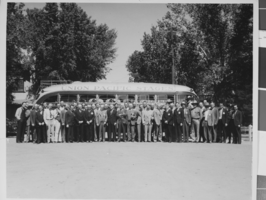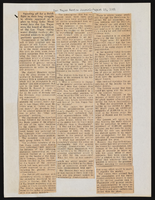Search the Special Collections and Archives Portal
Search Results

Photograph of Rotarians Banquet, Las Vegas, March 28, 1941
Date
Archival Collection
Description
Image
Albert Risley oral history interview
Identifier
Abstract
Oral history interview with Albert Risley conducted by his granddaughter, Wendy Dalmas, on February 27, 1979 for the Ralph Roske Oral History Project on Early Las Vegas. In this interview, Risley discusses the development of Boulder City, Nevada after his transfer there from Denver, Colorado in 1944. Risley discusses creating a point-based system which was used to assign housing to government employees based on their status and needs. Risley describes life in Boulder City during World War II, and the nearby U.S. Army camp, Camp Williston, which was established to protect Boulder (Hoover) Dam during the war. Risley also describes observing nuclear weapons tests and his later career as a Contracting Officer and Procurement Officer for the Lower Colorado Region after being promoted in 1971.
Archival Collection
Dianna and Gerald Davis oral history interview
Identifier
Abstract
Oral history interview with Dianna and Gerald Davis conducted by Claytee D. White on May 6, 2021 for African Americans in Las Vegas: a Collaborative Oral History Project.
Gerald Davis was falsely arrested on a Sunday afternoon in October 1969, leading to a three-day riot in the Black Westside community of Las Vegas. The Davis' discuss this event as well as their respective backgrounds and past experiences living in Las Vegas, including the businesses they supported, the places they visited, and their employment history.
Subjects discussed include: 1969 riot; Jackson Ave; Officer Arrington; Westside School; and Charles Wyatt
Archival Collection
Helen Anderson Toland oral history interview
Identifier
Abstract
Oral history interview with Helen Anderson Toland conducted by Claytee D. White on February 21, 2007 for the African Americans in Las Vegas: a Collaborative Oral History Project. Toland discusses her childhood in Missouri and moving to Las Vegas, Nevada where her husband, who was a civil rights worker, lived. She also discusses her careers as a speech therapist and the first African American female principal in the Clark County School District. She then talks about her activism in the Las Vegas African American community.
Archival Collection
Anna Sipl Meyers oral history interview
Identifier
Abstract
Oral history interview with Anna Sipl Meyers conducted by Leita Kaldi Davis on twelve separate occasions from February 12, 2012 to December 07, 2012 for the Boyer Early Las Vegas Oral History Project. Meyers discusses her life in great detail, from living in concentration camps to owning Las Vegas, Nevada casinos, including the Casbah Hotel and the Queen of Hearts Hotel (now the Four Queens Hotel and Casino).
Archival Collection
Lon Bronson oral history interview
Identifier
Abstract
Oral history interview with Lon Bronson conducted by Barbara Tabach on May 23, 2018 for the Boyer Early Las Vegas Oral History Project. In this interview, Bronson discusses his early life in Keene, New Hampshire, and his initial interest in music. Bronson talks about arriving to Las Vegas, Nevada in 1985, the musical scene in the city at the time, and the musician’s union strike of 1989. He describes when casino shows switched from live musicians to prerecorded music, and the shortage of jobs for musicians after that decision. Lastly, Bronson discusses the current entertainment scene in Las Vegas.
Archival Collection
Michael Don Fraser oral history interview
Identifier
Abstract
Oral history interview with Michael Don Fraser conducted by Claytee D. White on September 15, 2017 and September 29, 2017 for the Boyer Early Las Vegas Oral History Project. In the first interview, Fraser discusses his early life in Osage County, Oklahoma. He talks about being a member of the Boy Scouts of America, attending the University of Tulsa, and his early interest in paper preservation. Fraser recalls working at his first conservation laboratory and repairing books. In the second interview, Fraser discusses digitization in his field of work, and the process of determining what items are worth repairing.
Archival Collection
Janice Allen oral history interview
Identifier
Abstract
Oral history interview with Janice Haupt Allen conducted by Barbara Tabach on November 27, 2017 for the Boyer Early Las Vegas Oral History Project. In this interview, Allen discusses her early life and arriving to Las Vegas, Nevada in 1947. She talks about her involvement in the Las Vegas community, becoming a news reporter with the
Archival Collection
Tyrone L. Seals oral history interviews
Identifier
Abstract
Oral history interviews with Tyrone L. Seals conducted by Claytee D. White and Sarah Beth Hawkins on April 25, 2016 and May 16, 2016 for the African Americans in Las Vegas: a Collaborative Oral History Project. In the first interview, Seals discusses his upbringing in Las Vegas, Nevada and growing up in the Westside. He talks about experiencing discrimination, employment limitations, and entertainment on Jackson Street. In the second interview, Seals remembers school integration, organizations for African American women, and protests during the 1960s. Lastly, Seals discusses the significance of religion in the African American community and becoming a pastor.
Archival Collection

